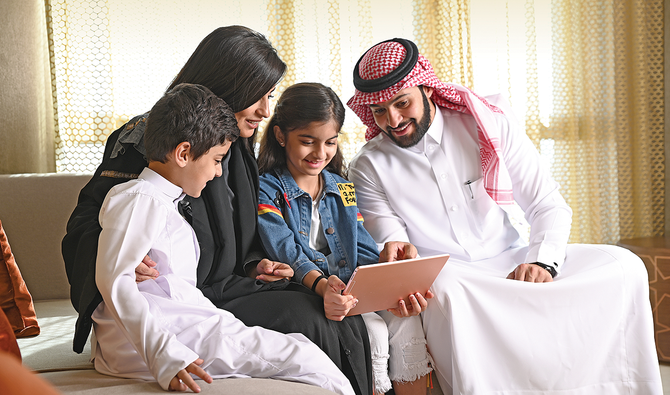JEDDAH: The privacy of individuals and organizations should be at the heart of all cybersecurity services, experts at a Saudi-led webinar were told.
Panelists at the virtual meeting, held under the umbrella of King Saud University and conducted by the Saudi Social Studies Society (SSSS), discussed the role of state and private sectors in foreseeing the future of public services.
The three-hour seminar was moderated by Dr. Abeer Rasheed, vice dean of the preparatory year and supporting studies at Imam Abdulrahman bin Faisal University, and attended by delegates including Dr. Fahad Al-Odayani, vice dean for development of the faculty of computing and information technology at the Rabigh campus of King Abdul Aziz University (KAU), Dr. Ghayda Al-Juwaiser, assistant professor at the faculty of media and communication at KAU, and Dr. Bandar Al-Asiri, general supervisor at the Ministry of Education.
Speaking about cybersecurity and its role in digitizing the Saudi family, Al-Odayani noted that the aim was to guard programs, electronic apps, and to protect human and financial resources.
“It also aims at combating cybercrimes or reducing their impact to the lowest possible level. Cybersecurity has become a weapon at the hands of both governments and individuals. It is one of the modern war techniques used by countries. Cybersecurity also helps in transferring big data securely,” he said.
He gave an example of serious hacking attempts into a key Saudi website and revealed that the Ministry of Interior’s Absher website had been targeted more than 100 times. None of the attempts had been successful.
“We would like to thank the Interior Ministry for bringing such powerful platforms and applications. Absher is one of the best applications. It was made 100 percent secure to ensure the data and information of the citizens and residents are safe,” Al-Odayani added.
Al-Asiri told Arab News: “The information about Absher is accurate, but it is no wonder, as attacks on all applications and companies occur every now and then.
However, it is the end that counts. The Absher application and the National Cyber Security Center (NCSC) are highly capable of blocking such attempts.”
He pointed out that some businesses and large commercial organizations had been forced into bankruptcy due to cyberattacks.
“The Saudi government was aware of these risks of cyberattacks, and that is why we have two essential cybersecurity agencies – the National Cybersecurity Authority and the Saudi Federation for Cyber Security and Programming. These facts make us reassured that our data is in safe hands. They also make us focus more on setting up digital security for individuals,” he added.
The webinar panelists discussed the definition of cybersecurity and how it meant different things to different people.
Al-Odayani said that there were several definitions to cybersecurity, but most people specializing in the field defined it as the procedures of protecting the technological resources of a certain country or community.
“For example, all the ministries should have fully secured websites for the big data they contain. This makes them a priceless treasure for criminal hackers. The cybersecurity is there to preserve these resources,” he added.
He noted that the Sony PlayStation Network was attacked in 2011, and the company had done its best to regain its customers’ confidence after their data was exposed. “Security is more important than the programs and software themselves.”
Al-Odayani said that privacy was fully respected in Saudi Arabia, but internet users should not share their information with everyone.
“There is an international law regarding privacy. Article 12 of the Universal Declaration of Human Rights states, ‘no one shall be subjected to arbitrary interference with their privacy, family, home or correspondence, nor to attacks upon their honor and reputation. Everyone has the right to the protection of the law against such interference or attacks.’”
He defined digital security as the effective and optimal use of the internet without being exposed to risk or the threat of intrusion on privacy.
Al-Juwaiser highlighted the challenges facing digitization of Saudi families, giving examples such as Absher, Najiz, family ID cards, Madrasati, and digital clinics.
“We really need to conduct studies on how families see their children using the internet. Some families reject all kinds of digitization, while others are entirely with the move. Meanwhile, other families are able to create a sort of balance between the two sides,” she said.
Some families cannot afford the cost of electronic devices for home learning, something that could “depressingly affect their children’s performance. Moreover, children are subject to cyberbullying when surfing the internet,” Al-Juwaiser added.
Dr. Theeb Al-Dosari, a webinar participant, asked Al-Asiri how parents could make their children more aware of dubious sources of information.
“School curriculums can help our children learn how to take information from authentic sources. That way, such rumors will not affect them,” said Al-Asiri.
“Such fears are justified; as some parents are technologically illiterate, but luckily the new generation is doing well in dealing with the Ministry of Education’s Madrasati application, and families are beginning to show how much they are enjoying educational platforms.”
He warned that people should not let their fears get the better of them to the point that they avoided digitization which would only lead to digital illiteracy.
























